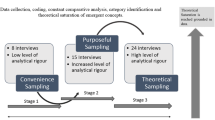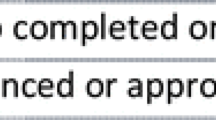Abstract
This paper builds upon the empirical findings of the research work that was conducted to identify the issues and challenges which the stakeholders at the International Maritime Organization (IMO) are facing when implementing the United Nation’s 2030 Agenda for sustainable development and the sustainable development goals (SDGs) in the international maritime transport domain (https://doi.org/10.1007/s13437-018-0147-2). The first paper, which outlined the findings, introduced grounded theory as the research methodology that was used, explained the research and analytical process undertaken, presented the key findings, and put forward six propositions based on empirical data gathered from 47 interviews. The present paper examines the IMO stakeholders’ stance toward a more strategic SDG-related action and a governance approach within IMO. It provides an assessment of the extent to which the representatives attending IMO meetings believe in the importance of strategizing towards attaining sustainable development and the SDGs. The paper outlines the key constructs, which emerged as a result of the gaps that were identified, and proposes an institutional conceptual framework that can be adopted by IMO as a structure to mitigate the severity of the issues identified by this research, thereby facilitating the effective implementation of the SDGs by IMO and its stakeholders. The institutional conceptual framework, as one of the major outcomes of this study, brings together the most critical elements that were found to be important and need to be implemented so that issues that this study has identified can be addressed, and the implementation of the 2030 Agenda and the SDGs within the international maritime transport domain can be accelerated and mainstreamed.









Similar content being viewed by others
Notes
Both frameworks have been validated with interviewees as part of the research process. This is in line with Birks and Mills’ (2017) view on applying grounded theory research.
One of the authors has over 20 years of experience of active participation in meetings at IMO in London and at other UN bodies within the international fora dealing with international maritime policy matters.
The strategic plan is the IMO’s strategic platform by virtue of which any desired SDG outcome is to be attained and any trade-offs with the environmental, societal and economic dimensions of sustainable development are to be made.
On a level of the IMO’s strategic plan, the list of outputs for the 2018-2019 Biennium of the strategic plan of IMO for the six-year period 2018-2023 contained only two outputs related to SDGs listed under two Strategic Directions out of a total of seven Strategic Directions (IMO 2017b).
In some cases, Member States with open registers are represented at IMO by private companies operating their ship register, thus being able to exert a strong influence on the development of maritime law.
The IMO Member State Audit Scheme (IMSAS) provides an audited Member State with a possibility of an assessment of how effectively it implements and adminsters the mandatory IMO instruments falling under the Scheme (IMO, 2017a)
References
Birks M, Mills J (2017) Grounded theory: a practical guide, 2nd edn. Sage Publications Inc, London
Corbin J, Strauss A (2015) Basics of qualitative research. Techniques and procedures for developing grounded theory. 4th ed. Thousand Oaks, California, Sage Publications, Inc
Charmaz K (2006) Constructing grounded theory: a practical guide through qualitative analysis. Sage Publications, London
Flick U (2009) An introduction to qualitative research, 4th ed. London: Sage Publications, Inc
Glaser B, Strauss A (1967) The discovery of grounded theory: strategies for qualitative research. Aldine Publishing Company, Chicago
Holton J, Walsh I (2016) Classic grounded theory: applications with qualitative and quantitative data. USA: Sage Publications Inc
Miles M, Huberman M, Saldaña J (2014) Qualitative data analysis, 3rd edn. Sage Publications Inc, USA
IMO (2017a) IMO Member State Audit Scheme. http://www.imo.org/en/OurWork/MSAS/Pages/AuditScheme.aspx. Accessed 21 March 2017
IMO (2017b) Assembly 30th Session: Consideration of the Report of Committee 1 https://docs.imo.org/Category.aspx?cid=30. Accessed 2 December /2017
IMO (2017c) How international shipping and the maritime community contribute to sustainable development: International Maritime Organization. http://www.imo.org/en/MediaCentre/HotTopics/Documents/IMO%20SDG%20Brochure.pdf. Accessed 03 April 2018
IMO (2017d) Report of the technical cooperation committee on its sixty-sixth session. https://docs.imo.org/Category.aspx?cid=51&session=66. Accessed 02 February 2017
IMO (2018a) The 2030 Agenda for sustainable development. Implementation of the 2030 Agenda for Sustainable Development Note by the Secretariat. https://docs.imo.org/Category.aspx?cid=51. Accessed 16 August 2018
IMO (2018b) Implementation of the 2030 Agenda for sustainable development. Summary report on the evaluation of the international maritime organization’s contribution to the achievement of the millennium development goals https://docs.imo.org/Category.aspx?cid=51. Accessed 27 December 2018
IMO (2018c) Report of the technical cooperation committee on its 68th Session. https://docs.imo.org/Category.aspx?cid=51&session=68. Accessed 21 December 2018
IMO (2019) IMO helps Member States with sustainability targets. http://www.imo.org/en/MediaCentre/WhatsNew/Pages/default.aspx. Accessed 30 January 2019
IMO (2019b) Council 122nd session summary of decisions. https://docs.imo.org/Category.aspx?cid=36. Accessed 10 August 2019
IMO (2019c) World Maritime theme for 2020: sustainable shipping for a sustainable planet. http://www.imo.org/en/MediaCentre/PressBriefings/Pages/17%2D%2Dworld-maritime-theme-for-2020.aspx. Accessed 28 July 2019
Sciberras L, Silva J (2018) The UN’s 2030 Agenda for sustainable development and the maritime transport domain: the role and challenges of IMO and its stakeholders through a grounded theory perspective. J.R. WMU J Marit Affairs 17:435. https://doi.org/10.1007/s13437-018-0147-2
Strauss A, Corbin J (1998) Basics of qualitative research: techniques and procedures for developing grounded theory, 2nd edn. California, Sage Publications Inc, Thousand Oaks
Strauss A, Corbin J (2008) Basics of qualitative research: techniques and procedures for developing grounded theory, 3rd edn. California, Sage Publications Inc, Thousand Oaks
United Nations (2017) Resolution adopted by the general quadrennial comprehensive policy review of operational activities for development of the United Nations system. http://undocs.org/A/RES/71/243. Accessed 06 May 2017
United Nations (2017b) Repositioning the United Nations development system to deliver on the 2030 Agenda: ensuring a better future for all, Report of the Secretary-General https://digitallibrary.un.org/record/1298793/files/A_72_124%26E_2018_3-EN.pdf. Accessed 06 June 2018
United Nations (2017c) Report of the Secretary-General mainstreaming of the three dimensions of sustainable development throughout the United Nations system. http://www.un.org/ga/search/view_doc.asp?symbol=A/72/75&Lang=E. Accessed 28 June 2017
United Nations (2018) Shifting the management paradigm in the United Nations: implementing a new management architecture for improved effectiveness and strengthened accountability. http://undocs.org/A/72/492. Accessed 17 November 2017
Disclaimer
The content of this paper does not necessarily reflect the official opinion of the European Maritime Safety Agency. Responsibility for the information and views expressed in this study lies entirely with the authors.
Author information
Authors and Affiliations
Corresponding author
Additional information
Publisher’s note
Springer Nature remains neutral with regard to jurisdictional claims in published maps and institutional affiliations.
Appendix
Appendix
1.1 Interview prompt list and guidelines
These semi-structured questions/prompts were developed after the first interviews were conducted. During the first interviews, unstructured questions were also asked, and which then led to the development of the following prompt list for the interviews that followed. The use of these semi-structured questions/prompts enabled more flexibility and ensured that the emerging concepts and constructs were fully developed and saturated as required by grounded theory.
1.2 The UN 2030 Agenda for Sustainable Development—strategy and governance
-
The UN 2030 Agenda for Sustainable Development, its substantial role in establishing a sustainable maritime transportation system, the importance of sustainable development for shipping, shipping’s global impact on world’s economy;
-
Challenges that the stakeholders (Contracting Governments–IMO Member States, NGOs, IGOs) are facing in respect of the 2030 Agenda, sustainable development strategies (i.e., plan of action);
-
Challenges in respect of governance (process of decision-making and the process by which decisions are implemented);
-
Issues encountered at the level of maritime administrations, national set-up, policy coherence, cross-cutting issues, and coordination matters;
-
Need for an international strategic response towards implementing the SDGs in the maritime transport domain, led by whom (i.e., IMO) and how;
-
National sustainable development strategies, relevant strategic determinants/factors for the development of a sustainable maritime transportation system;
-
Importance of the three dimensions of sustainable development - the economic, the environmental, and the social dimensions. The importance of addressing them equally and in a balanced way;
-
Country/entity’s alignment with sustainable development strategies, strategy in place at national level, governance mechanisms;
-
Effectiveness of sustainable development strategies adopted by the country/institution, impact on the development of the national maritime transportation;
-
Importance of governance frameworks (international and national), approaches to sustainable development strategies for the implementation of the SDGs.
1.3 IMO’s strategic plan
-
Need for IMO to align its strategic plan and strategic directions, and corresponding outputs (all or partially) to respond to the 2030 Agenda. Policy coherency, complementarity, and efficiency;
-
IMO strategic plan: enabling its Agents to respond to the 2030 Agenda/requires an institutional change within IMO;
-
SDG action plan (should there be one), IMO’s support to contracting governments in the translation of the SDGs into national policy through the Country Maritime Profiles (CMP) and the National Maritime Transport Policies (NMTPs);
-
IMO Organs, TC's work on the 2030 Agenda SDGs vis-à-vis other IMO Committees, i.e. MSC, MEPC, FAL;
-
Best international governance structure for IMO to realize the SDGs; IMO v is-á-vis other UN bodies;
-
SDG milestones that may be set to be effectively and efficiently reached, importance of contracting governments’ contribution at IMO, implementation of an SDG action plan (or another mechanism) to clearly set out the SDG outputs, IMO’s transformation to support Member States in the achievement of the SDGs;
-
Need for IMO’s existing initiatives to be fine-tuned to better support the achievement of the SDGs at national and international level;
-
IMO’s support to developed/developing countries, least developed countries (LDCs), and Small Island Developing States (SIDS);
-
IMO Secretariat’s contribution in the review of SDGs at the UN, in its work program and sessions;
-
IMO Council/Assembly’s work on SDGs: (i) focus only on some SDGs, i.e. Goal 14: conserve and sustainably use the oceans, seas, and marine resources for sustainable development); (ii) evaluate any progress made on all the 17 SDGs such as gender equality, life below water, climate action, and quality education; or (iii) address several SDGs every year, as may be decided;
-
IMO’s support for the participation by the relevant stakeholders in the follow-up and review processes conducted at the global/regional/national level, including the thematic and country reviews on SDGs, i.e. working group/task force on SDGs.
1.4 Contribution of contracting governments/Member States/IGOs/NGOs
-
Member States’ contribution to the work of IMO towards implementing the SDGs, issues encountered, support from national government entities, coordination, etc.;
-
Challenges/issues the country and/or contracting governments/IGO/NGOs are experiencing or can experience, i.e.,when implementing the SDGs, when providing SDG input to IMO in respect of the IMO strategic plan and work within the IMO organs.
1.5 Follow-up
-
Ways for IMO and the Member States/IGOs/NGOs to work coherently on SDGs, follow-up and review of the 2030 Agenda and the SDGs;
-
Role of the IMO in the follow-up and review of the implementation of the 2030 Agenda;
-
Steps which IMO or contracting governments may take to best support/follow-up and review the implementation of SDGs at international, regional, or national in a coherent and effective manner.
Rights and permissions
About this article
Cite this article
Sciberras, L., Silva, J.R. Establishing an institutional conceptual framework for effective delivery of the United Nations SDGs: an application of grounded theory to assist IMO stakeholders. WMU J Marit Affairs 18, 379–404 (2019). https://doi.org/10.1007/s13437-019-00182-y
Received:
Accepted:
Published:
Issue Date:
DOI: https://doi.org/10.1007/s13437-019-00182-y




